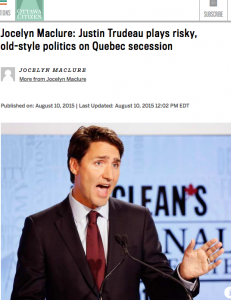An extraordinary spectacle is being played out across the land, as newspaper editorial boards are forced by their owners to endorse the Conservative Party. (As Paula Simmons put it, with regard to the Edmonton Journal’s endorsement of Harper: “And yes. Before you ask, this was a decision made by the owners of the paper. As is their traditional prerogative.”) The result has been the most tepid series of endorsements and backhanded compliments I can recall. Here is the Globe and Mail’s, which so far has attracted the most derision. Here is the Ottawa Citizen. The National Post has not released its own yet, but it looks as though they’re having to directly censor Andrew Coyne. So hard to get good help these days! You can make them say what you want, but it’s so hard to get them to sound enthusiastic when saying it.
Update: Andrew Coyne has resigned from his position as National Post opinion page editor… Continue reading

